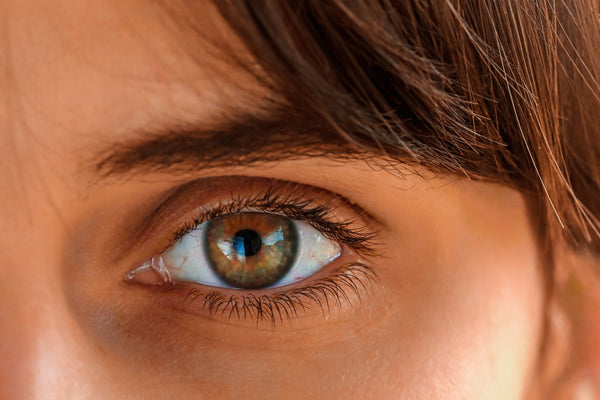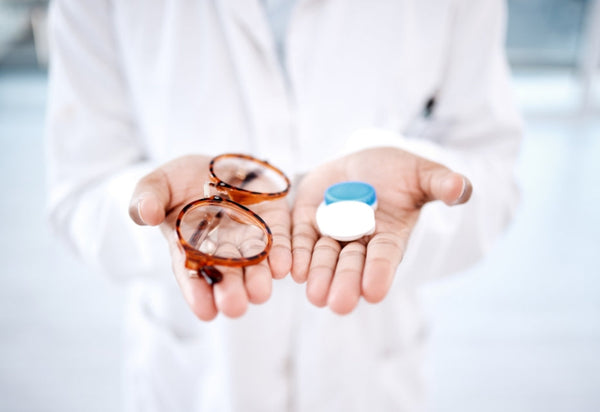
It can be startling to look in the mirror and see a bright red patch in your eyes. Despite being reminiscent of a horror movie, a burst blood vessel in your eye, also known as a subconjunctival haemorrhage, is rarely anything to be worried about and will clear up by itself in a few days.
Read on to learn more about the causes and what to do if you have a burst blood vessel in your eye.
What is Subconjunctival Haemorrhage?
A subconjunctival haemorrhage is when a tiny blood vessel breaks just underneath the clear conjunctival layer of the eye. The blood gets trapped between the sclera (the white of the eye) and the clear conjunctival layer, leaving a red patch or streak that can look quite dramatic.
Some people might feel a small popping sensation when a subconjunctival haemorrhage occurs, while others won’t feel a thing and only notice the haemorrhage when they look in the mirror.
A subconjunctival haemorrhage is just like a bruise on the skin. It is self-limiting and will resolve without any treatment – typically within 7 to 10 days, but can take up to 3 weeks – going from red to pink/brown to yellow and eventually clearing completely.
Usually, a subconjunctival haemorrhage is painless but can result in a generalised tenderness around the eye. Additionally, your eye may feel slightly uncomfortable when blinking due disruption to the tear film. An over the counter ocular lubricant can help to provide some relief from this discomfort.
What are the Reasons Behind a Blood Vessel Bursting in the Eye?
In most cases, a subconjunctival haemorrhage occurs spontaneously with no underlying reason, but there is a higher incidence of subconjunctival haemorrhage in those over 50.

Common causes of burst blood vessels include
- Violent coughing
- Powerful sneezing
- Straining
- Vomiting
- Roughly rubbing your eye
- Trauma, such as from a foreign object
A subconjunctival haemorrhage can happen to anyone but is more common in those with vascular diseases such as high blood pressure or diabetes or those with some blood conditions. In these conditions, the blood vessels become more fragile and are, therefore, more prone to breaking. People on medications such as blood thinners (aspirin, warfarin, etc.) and non-steroidal anti-inflammatory drugs (NSAIDs) may also have a higher incidence of subconjunctival haemorrhages.
A subconjunctival haemorrhage can occur due to localised trauma due to injury in which case medical attention should be sought straightaway. If you have had a subconjunctival haemorrhage as a result of a head injury, please also seek medical attention straight away.
Subconjunctival haemorrhages can also occur due to violent coughing, sneezing, straining or vomiting. This action briefly raises the pressure within the veins, leading to the rupturing of one of the fine capillaries. It may also occur due to eye rubbing or straining, such as when trying to lift a heavy object. It’s also not uncommon for a subconjunctival haemorrhage to occur following eye surgery.
What should you do if you have a burst blood vessel in your eye?

1. Remain calm
Although it can be worrying when you spot a burst blood vessel in your eye, it’s important to remain calm – it’s unlikely to be due to anything serious.
2. Avoid rubbing
Whatever you do, don’t rub your eye. It might feel swollen and tender, and rubbing it can worsen the problem.
3. Good hygiene:
Before touching your eye in any way, wash your hands with warm water and soap.
4. Use a cold compress
Apply a cold compress to reduce swelling and soothe your eye, as well as minimise any pain.
5. Artificial tears
Artificial tear drops may help relieve any irritation. And if required, you can use your preferred pain relief as necessary.
6. Limit strain
Try to limit any activities that can raise your blood pressure – no heavy lifting, and no straining on the toilet.

7. Wear sunglasses
If you’re uncomfortable with people seeing your eye looking so bloodshot, feel free to wear sunglasses if you need to.
8. Monitor symptoms
Monitor your eye over the next few hours and days – if you notice the blood increasing in volume or your symptoms worsening, consult your doctor.
9. Avoid certain medications
Some medications, such as aspirin, can thin your blood and worsen the blood pooling. Non-steroidal anti-inflammatory drugs (NSAIDs) such as ibuprofen can also make you more prone to developing a subconjunctival haemorrhage. If you can, avoid taking these medications.
10. Consult a health specialist doctor
It is advisable to have your vascular health checked as a precaution just to make sure there is no underlying health condition that has caused the subconjunctival haemorrhage to occur.

If you have had a subconjunctival haemorrhage, this may result in a weakened blood vessel in the area, and you may experience another subconjunctival haemorrhage in future. If you experience repeated subconjunctival haemorrhages, please see your GP to review your vascular health and advise your GP of the incidence of subconjunctival haemorrhages.
If you experience any loss of vision, or pain when moving your eye, you should consult a health specialist to ensure there are no underlying issues.
What are the risk factors for a subconjunctival haemorrhage?
Diabetes
Diabetes is a condition that can damage blood vessels all over the body. The damage to your eyes starts when sugar in your blood blocks the tiny blood vessels that go to your retina, causing them to leak fluid or bleed.
High blood pressure
High blood pressure can cause the small capillaries in you to burst. This is why you should have your blood pressure tested if you’re prone to subconjunctival haemorrhages.
Blood clotting disorders
If your blood has trouble clotting, this can make your blood thin, which means you might bleed a lot more than normal over even the smallest cuts.
Final thoughts
Despite looking serious, burst blood vessels in your eyes are rarely anything to be overly concerned about. However, if you are prone to them and get them repeatedly, or if you have a long-term health condition like hypertension or diabetes, it’s important to get your health checked out by your GP.
Your eye health is important, so make sure you’re booking your regular eye tests with Leightons.








